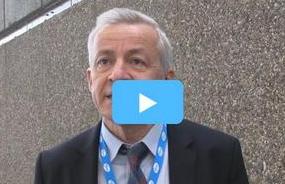Advertisment
ECCO 2016: Professor Jean-Frederic Colombel (New York, USA) and Dr James Lindsay (Barts and the London NHS Trust, UK) discuss new data from the GEMINI programme showing patient populations that do well and long term data with vedolizumab

Update from the GEMINI study programme – by Maria Dalby
Jean-Frédéric Colombel, Mount Sinai Hospital, New York, USA
The GEMINI study programme is a large phase-3 clinical trial programme to evaluate vedolizumab, a gut-selective humanised monoclonal antibody against integrin α4β7, for the treatment of ulcerative colitis (UC) and Crohn’s disease (CD). The GEMINI 1 and GEMINI 2 studies have shown that vedolizumab is effective and well tolerated for induction and maintenance therapy in patients with UC and CD, respectively,1, 2 and vedolizumab is approved in the US and Europe on the indications of moderately to severely active UC or CD with inadequate or lost response to, or intolerance to either conventional therapy or anti-tumour necrosis factor‑alpha (TNFα) therapy. Professor Jean-Frédéric Colombel from New York presented the results of exploratory post-hoc analyses which show that the clinical response and remission rates achieved with vedolizumab are dependent on disease severity and whether or not the patient has failed on prior anti-TNF therapy.
In GEMINI 1, the post-hoc analysis evaluated clinical response at week 6 and clinical remission at week 52 in patients with a Mayo score <9 or ≥9 at baseline and with or without prior anti-TNF failure. Both disease severity and prior anti-TNF-failure were associated with significantly poorer outcomes: in the combined subgroup analysis, the response rate at 6 weeks was 65% in the vedolizumab arm compared and 33% in the placebo arm in patients with Mayo score <9 and no prior anti-TNF failure, compared with 33% and 18%, respectively, in patients with Mayo score ≥9 and prior anti-TNF failure. Similar differences were seen for clinical remission rates at week 52. In GEMINI 2, disease activity was defined as a CDAI score of ≤330 or >330 at baseline – in this analysis, clinical remission rates at week 6 in the combined subgroup analysis were 27% in the vedolizumab arm and 11% in the placebo arm in patients with CDAI ≤330 and no prior anti-TNF failure, versus 4% and 6%, respectively in patients with CDAI >330 and prior anti-TNF failure. Professor Colombel suggested that these results may help identify patients who are more likely to achieve response and remission with vedolizumab.
Patients who participated in the GEMINI 1 study were eligible for inclusion in the GEMINI long-term safety (LTS) study which is currently in progress. Professor Colombel presented the results of an interim efficacy analysis which included 73 patients who have completed 152 weeks of cumulative treatment with vedolizumab (52 weeks in the GEMINI 1 study and 100 weeks in GEMINI LTS). Clinical improvements were observed during this period both in patients who had failed prior anti-TNF therapy and in patients who were anti-TNF naïve, with remission rates at 152 weeks of up to 53%. The safety profile recorded at 152 weeks in the GEMINI LTS study comprises 894 patients and is consistent with that previously reported for vedolizumab.1, 3 No cases of progressive multifocal leukoencephalopathy have been reported, and the rates of infusion-related reactions and malignancies were low (3% and <1%, respectively).
References
- Feagan BG, Rutgeerts P, Sands BE, et al. Vedolizumab as induction and maintenance therapy for ulcerative colitis. N Engl J Med 2013;369:699-710.
- Sandborn WJ, Feagan BG, Rutgeerts P, et al. Vedolizumab as induction and maintenance therapy for Crohn’s disease. N Engl J Med 2013;369:711-21.
- Colombel JF, Sands BE, Rutgeerts P, et al. The safety of vedolizumab for ulcerative colitis and Crohn’s disease. Gut 2016.





